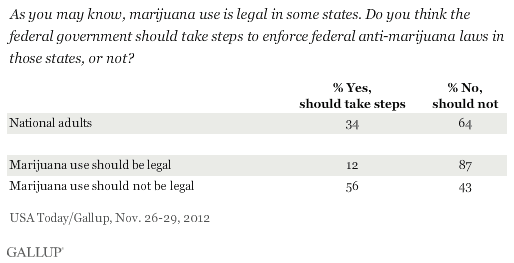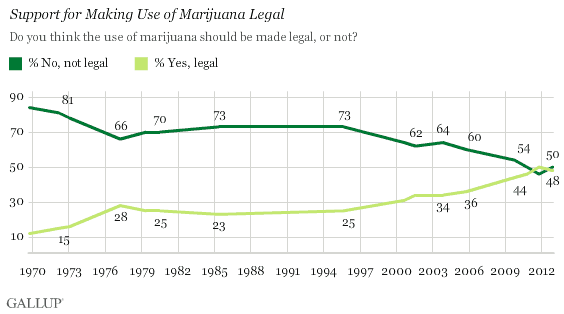PRINCETON, NJ -- Sixty-four percent of Americans are against the federal government's taking steps to enforce federal anti-marijuana laws in states where marijuana is legal. Americans who personally believe that marijuana should be legal overwhelmingly say the federal government should not get involved at the state level, along with four in 10 of those who are opposed to legalized marijuana.

The issue of what the federal government should do in these situations is particularly relevant, given recently passed initiatives in Washington and Colorado that legalized possession of small amounts of marijuana. These state-level laws are at odds with the federal Controlled Substances Act that makes marijuana use illegal. Although all of the precise specifications of the new law in Washington have not yet been determined, the fact that a number of pot smokers gathered near the Space Needle in Seattle last week to publicly celebrate their state's new law underscored this potential conflict between what could be legal under new state laws while remaining illegal at the federal level.
The results from the Nov. 26-29 USA Today/Gallup poll indicate that the average American sides with the states in these instances of conflict.
At the same time, Americans remain quite divided in their overall support for legalization of marijuana use, with 48% in the poll saying it should be legal, and 50% saying it should not be. Americans' views are roughly the same as they were last October, but as recently as 2005, only about a third of Americans supported marijuana legalization. In 1969, when Gallup first asked about the issue, 12% supported legalizing pot.

Gallup's trend question wording does not specify whether the legalization in question is at the federal or the state level. It is possible that Americans have differing views on the issue of making marijuana legal in certain states as opposed to a blanket law at the federal level that covers the entire country.
Six in 10 Americans aged 18 to 29 support legalizing marijuana, while about as many of those 65 and older are opposed. The bulk of middle-aged Americans -- those aged 30 to 64 -- are split on the issue.

Americans also differ on this issue by partisanship, with a majority of Democrats in favor of legalization and a majority of Republicans opposed. Independents are split.
Bottom Line
The legalization of marijuana in Colorado and Washington has highlighted the challenges the federal Justice Department faces in its decision-making on how to handle state laws on marijuana use that conflict with national laws. The significant majority of Americans would advise the federal government to focus on other issues, even though public pot smoking in states where it is legal flouts national laws currently on the books.
By contrast, there is no clear-cut direction from the American public on the underlying issue of legalizing use of marijuana. Although support for legalization has risen substantially over the past 43 years, the public remains divided, with Democrats and young people most in favor, while Republicans and older Americans are most likely to be opposed.
Survey Methods
Results for this USA Today/Gallup poll are based on telephone interviews conducted Nov. 26-29, 2012, with a random sample of 1,015 adults, aged 18 and older, living in all 50 U.S. states and the District of Columbia.
For results based on the total sample of national adults, one can say with 95% confidence that the maximum margin of sampling error is ±4 percentage points.
Interviews are conducted with respondents on landline telephones and cellular phones, with interviews conducted in Spanish for respondents who are primarily Spanish-speaking. Each sample includes a minimum quota of 400 cellphone respondents and 600 landline respondents per 1,000 national adults, with additional minimum quotas among landline respondents by region. Landline telephone numbers are chosen at random among listed telephone numbers. Cellphone numbers are selected using random-digit-dial methods. Landline respondents are chosen at random within each household on the basis of which member had the most recent birthday.
Samples are weighted by gender, age, race, Hispanic ethnicity, education, region, adults in the household, population density, and phone status (cellphone only/landline only/both, cellphone mostly, and having an unlisted landline number). Demographic weighting targets are based on the March 2011 Current Population Survey figures for the aged 18 and older U.S. population. All reported margins of sampling error include the computed design effects for weighting.
In addition to sampling error, question wording and practical difficulties in conducting surveys can introduce error or bias into the findings of public opinion polls.
View methodology, full question results, and trend data.
For more details on Gallup's polling methodology, visit www.gallup.com.
